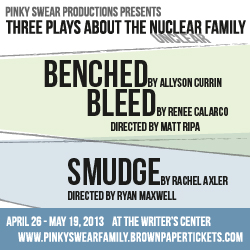 When the bonds that hold the family together are broken, twisted, or begin to dissolve, what is the shape of the thing that’s left? Is it still a family, something less, or something more? This spring, Pinky Swear Productions presents three plays, including two world premieres by D.C. playwrights, that ask this question in the most startling of ways. Today, we're featuring Bleed by Renee Calarco, which tells the story of a husband and wife playing the last round of a delicate game that’s defined their marriage. Thoughts on Bleed from the Artistic Directors ...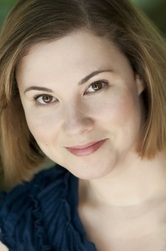 JACQUELINE LAWTON: What excited you about programming BLEED by Renee Calarco as part of Pinky Swear Productions this season? KAREN LANGE: Renee writes. So. Well. Her script moved me from the moment I read the first few pages. The characters are so very real – there is nothing false or “theatrical” about them. The dialogue is natural and sounds exactly like how people really talk. Plus, her portrayal of a couple at a pivotal point in their relationship, where everything is at stake, is something everyone can relate to. 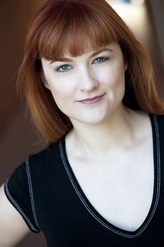 JACQUELINE LAWTON: If there is one thing you want audiences to walk away knowing or thinking about after experiencing BLEED, what would that be? ALLYSON HARKEY: I want our audiences to walk away reflecting on what and who are important in their lives. The question of how one moves on after a game-changing event is something we’ll all grapple with at one time or another. How we treat each other at those times, well – those are the defining moments of our lives. Thoughts on Bleed from the Director ...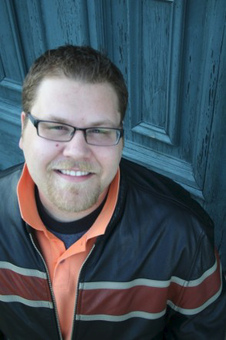 JACQUELINE LAWTON: What excited you about directing BLEED by Renee Calarco at Pinky Swear Productions? What made you say yes? MATT RIPA: I actually sought out Pinky Swear to direct this play. I was privileged to direct the original reading of BLEED when it was part of Doorway Arts Ensemble's Playground Reading series. I was able to work on this play from its infancy and help Renee in its development. So, it is as if I helped birth the play and now I get to see it through its toddler years. BLEED has such a strong heart and engine that to direct it is truly a gift. JL: What has been the most challenging/exciting part of bringing BLEED to the stage? MR: The play asks a lot of the actors. It has a very deep emotional pull and it can be very rewarding to work with actors to find that emotional place and help guide them towards this raw emotion. As I said before, I got to develop this play in a reading, so the exciting part is to give it some legs. To put it on its feet, on a set and see how it translates. It reads well, and I am finding it even more engrossing when you can create the full world of a new play. JL: If there is one thing you want audiences to walk away knowing or thinking about after experiencing BLEED, what would that be? MR: I always have a hard time with this question as a director. I like to think that I can control how an audience experiences a show through the direction, but I always find this to be a futile endeavor. I don't know what I want them to experience because each person in the audience will experience it differently. For a mother or father, this play will leave them with a lot to think about and I hope they would go home and hug their child a little tighter. For myself, not being a parent, I often leave rehearsal wondering what I would do if faced with the main conflict of the play. Thoughts on Bleed from the Playwright ...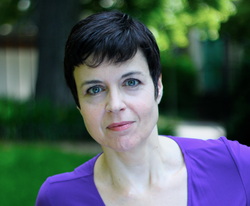 Jacqueline Lawton: What do you hope to convey in the plays that you create--what are they about? What sorts of people, situation, circumstances, do you like to write about? RENEE CALARCO: Oddly, a lot of my plays are about children in one way or another. No kidding, the characters in my plays are pregnant, desperately wanting to have children, desperately NOT wanting to have children, or searching for a missing child. Sometimes there’s an absent child. Sometimes I’ve got grown children who are trying to break free from their families. I don’t have children of my own, so I guess folks can read into that whatever they like! The other thing I’m obsessed with is class and social status. It’s not necessarily a theme that is front-and-center in my plays, though it is pretty prominent in BLEED. I come from a working-class family and grew up in a neighborhood that was more-or-less evenly split between blue collar and white collar families. My hometown, Rochester, NY, is home to both universities and manufacturing, and I guess I’ve always been fascinated by how people of different classes live and work together. There’s a tension, I think. Of course, a lot of the manufacturing is gone now. Eastman Kodak, the company that made Rochester a company town, laid off thousands of workers over the past twenty years and it had kind of a devastating effect on the local economy. I read that they’re coming out of bankruptcy now. JL: Tell us about your play, BLEED, and what inspired you to write it. RC: It came out of a writing exercise that I did a few years ago at the Kennedy Center’s Playwriting Intensive. The great playwright Michael Weller gave us an assignment: write a two-page play based on a song. I picked Bruce Springsteen’s “Brilliant Disguise,” which is about infidelity. The characters, Dez and Marla, are closing up their dive bar at the end of the night. Dez suspects that Marla’s been having an affair. It’s basically two pages of these characters loving and hating each other. Finally, Dez deliberately cuts his finger with a broken vodka bottle and draws a line of blood on Marla’s cheek. And …scene. The only elements from that short play that made it into the current BLEED are the character’s names. And the blood. But not in the way you might think. JL: What excited you about having your play presented as part of Pinky Swear Productions? RC: Everything. That the Pinky Swear women do work by women. That they’re bold and fearless and visionary. Also, Ally Currin and I had been saying for a few years that we HAVE to work together. By total coincidence, we’d both written these plays that are set on a playground and are about absent children. So it was a huge, thrilling deal to have all of these parts come together to make this work. JL: What do you hope audiences are thinking about after experiencing BLEED? RC: That we’re all stronger than we think we are. That humor is the one thing that makes us human and gets us through really awful life events. That class resentment is real---even among family members. 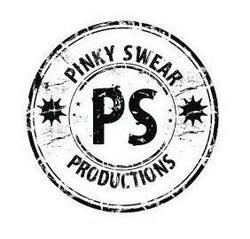 Pinky Swear’s Mission is to produce modern plays with strong, engaging women’s roles where people talk to each other and things happen. Our productions are a little funny, a little dark, and a lot entertaining. Our goals are to:
0 Comments
Your comment will be posted after it is approved.
Leave a Reply. |
My BlogI'm a playwright, dramaturg, and teaching artist. It is here where you'll find my queries and musings on life, theater and the world. My posts advocate for diversity, inclusion, and equity in the American Theatre and updates on my own work. Please enjoy!
Categories
All
Archives
June 2020
Reading List
|
